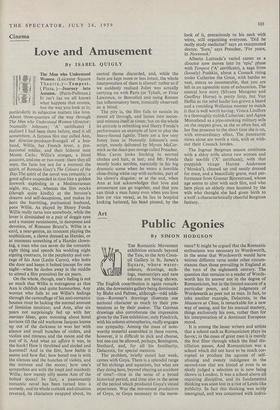Cinema
Love and Amusement
By ISABEL QUIGLY
The Man who Understood Women. (Leicester Square Theatre.)—Tempest. ( Plaza. )—Journey into Autumn. (Paris-Pullman.) IT isn't (as we all know) what happens that counts, but the way you look at it; particularly in subjective matters like love. About three-quarters of the way through The Man who Understood Women (director: Nunnally Johnson; 'A' certificate) I realised I had been there before, read it all somewhere. A famous film star called Ann, her director-producer-Svengali of a hus- band, Willie, her French lover, a pro- fessional soldier, and their hideout near Monte Carlo; Willie's stooges, a hired assassin, and one or two more: there they all were, the facts but not for a moment the spirit. of Romain Gary's The Colours of the Day.The spirit of the novel was romantic: a ,great affaire suspended in time like a golden firework exploding in a Mediterranean night, etc., etc., whereas the film mocks On the whole, though, one's feeling is not so much that Willie is outrageous as that Ann is childish and quite humourless. Any woman who fails to see Willie's feelings through the camouflage of his anti-romantic bounce must be lacking the normal amount of feminine intuition; and Ann, after six years not surprisingly fed up with her manage blanc, goes mooning about hotel terraces till the old warhorse Jacques looms up out of the darkness to woo her with silence and small bunches of violets, and violins and mimosa and the moon and the rest of it. And what an affaire it was, in the book! How it throbbed and sizzled and hummed! And in the film, how feeble it seems and how flat; how bored one is with the silences and the bunches of violets, and the mimosa and the moon; how one's sympathies are with the inept and maidenly Willie; how merely silly seems Ann of the bolted doors! In fact, a passionately romantic novel has been turned into a comedy, and its whole outlook and situation reversed, its characters swapped about, its central theme discarded, and, while the facts are kept more or less intact, the whole interpretation of them is altered: rather as if we suddenly realised Juliet was actually carrying on with Paris (or Tybalt, or Friar Lawrence, or Benvolio) and using Romeo (an inflammatory bore, ironically observed) as a blind. The pity is, the film fails to sustain its mood all through, and lapses into moon- and mimosa itself at times; but on the whole its attitude is refreshing and Henry Fonda's performance an example of how to play the heavy-footed lightly. There are a few very funny lines in Nunnally Johnson's own script, mostly delivered by Myron McCor- mick as the dead-pan stooge called Preacher. Miss Caron looks fetching in normal clothes and hair, at last; and Mr. Fonda mostly looks terrible, especially in his big dramatic scene when he wears a horrible close-fitting white cap with earholes, part of his clown's disguise; or at the end, when Ann at last acknowledges that love and amusement can go together, and that you can think a man funny even when you love him (or vice versa), as he lies in hospital looking battered, his head pinned, by the look of it, precariously to his neck with wires, still organising everyone.. 'Did he really study medicine?' says an exasperated doctor. 'Sure,' says Preacher. 'For years, in Newsweek.' Alberto Lattuada's varied career as a director now moves into its 'epic' phase with Tempest ('A' certificate), a saga from (loosely) Pushkin, about a Cossack rising under Catherine the Great, with battles so vast, extras so innumerable, that you are left in an agreeable state of exhaustion. The central love story (Silvana Mangano and Geoffrey Horne) is pretty limp, but Van Heflin as the rebel leader has grown a beard and a rumbling Wellesian manner to match it that is well worth having; Vivcca Lindfors is a thoroughly stylish Catherine; and Agnes Moorehead as a pipe-smoking military wife on the steppes gives, as she so often has, all her fine presence to the short time she is on, with extraordinary effect. The panoramic views alone are worth a visit, with or with- out their Cossack hordes. The Ingmar Bergman season continues with a shiny trifle about two women and their sex-life ('X' certificate), with that puppyish virago Harriet Andersson ('Monica'), cleaned up and neatly dressed for once, and a beautifully grave, mad per- formance from Gunnar Bjornstrand, whose age seems to alter with each film, and who here plays an elderly man haunted by the wife who thought she had given birth to a wolf: a characteristically cheerful Bergman fantasy.






































 Previous page
Previous page